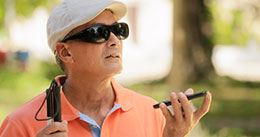 Master Bond Inc. formulates numerous adhesive grades for the assembly of equipment, tools, devices, products for individuals possessing a disability or impairment. This technology enables people with special needs including activities of daily living (ADLs) to accomplish specific tasks independently that they were previously unable to perform such as eating, bathing, mobility, dressing, grooming. They also permit people to speak, work, write, see and hear. Master Bond compounds consisting of epoxies, silicones, cyanoacrylates, UV/visible light compositions are used on standard, modified, customized, high tech systems. These versatile, high quality materials provide safety, comfort, strength, dependability, reliability, durability and ensure all appropriate requirements/needs are satisfied. They enhance improved lifestyles/overall well being, prevent impairments, activity limitations or participation restrictions.
Master Bond Inc. formulates numerous adhesive grades for the assembly of equipment, tools, devices, products for individuals possessing a disability or impairment. This technology enables people with special needs including activities of daily living (ADLs) to accomplish specific tasks independently that they were previously unable to perform such as eating, bathing, mobility, dressing, grooming. They also permit people to speak, work, write, see and hear. Master Bond compounds consisting of epoxies, silicones, cyanoacrylates, UV/visible light compositions are used on standard, modified, customized, high tech systems. These versatile, high quality materials provide safety, comfort, strength, dependability, reliability, durability and ensure all appropriate requirements/needs are satisfied. They enhance improved lifestyles/overall well being, prevent impairments, activity limitations or participation restrictions.
Doctors, teachers, rehabilitation engineers, occupational specialists, play a key role in recommending the most appropriate equipment, tools, devices for individuals with mobility impairment, cognitive disabilities, communication disorders, deafness, blindness and other disabilities. Our research and development staff's efforts have augmented product designs, performance to meet challenging goals especially for elderly individuals with significant impairments. Select Master Bond products furnish outstanding structural bond strength to similar/dissimilar substrates most notable stainless steel, glass, ABS, PVC, rubbers, acrylic substrates and guard against exposure from moisture, dust, dirt to coat/seal electronic parts. Additionally they are easy to process, cure at ambient temperatures, and fixture rapidly.
Master Bond adhesives are high performance and are instrumental in producing more specialty equipment, tools, devices. Some applications for Master Bond adhesives in assistive devices include
- wheelchairs
- scooters
- hearing aids
- electric assistive devices
- screen readers
- page turners
- ramps
- grab bars
- lightweight, mobility devices
- specialized handles
- prosthetic devices
- orthotic devices
A subcategory of assistive technology is adaptive technology. This technology is used by individuals with disabilities but infrequently by non-disable people.
- Large monitors
- Computers with voice output
- Computers with visual output
- Keyboard modifications
- Alternative types of keyboards and mouse
- Electronic pointing devices
- Text to speech synethisizers
- Good lighting
- Adjustable tables
- Handheld amplifiers
- Screen magnifiers
- Tricycles

